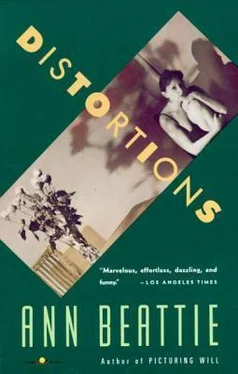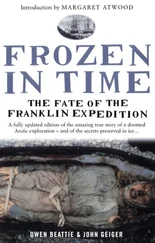Ann Beattie - Distortions
Здесь есть возможность читать онлайн «Ann Beattie - Distortions» весь текст электронной книги совершенно бесплатно (целиком полную версию без сокращений). В некоторых случаях можно слушать аудио, скачать через торрент в формате fb2 и присутствует краткое содержание. Год выпуска: 1991, Издательство: Vintage, Жанр: Современная проза, на английском языке. Описание произведения, (предисловие) а так же отзывы посетителей доступны на портале библиотеки ЛибКат.
- Название:Distortions
- Автор:
- Издательство:Vintage
- Жанр:
- Год:1991
- ISBN:нет данных
- Рейтинг книги:5 / 5. Голосов: 1
-
Избранное:Добавить в избранное
- Отзывы:
-
Ваша оценка:
- 100
- 1
- 2
- 3
- 4
- 5
Distortions: краткое содержание, описание и аннотация
Предлагаем к чтению аннотацию, описание, краткое содержание или предисловие (зависит от того, что написал сам автор книги «Distortions»). Если вы не нашли необходимую информацию о книге — напишите в комментариях, мы постараемся отыскать её.
Distortions — читать онлайн бесплатно полную книгу (весь текст) целиком
Ниже представлен текст книги, разбитый по страницам. Система сохранения места последней прочитанной страницы, позволяет с удобством читать онлайн бесплатно книгу «Distortions», без необходимости каждый раз заново искать на чём Вы остановились. Поставьте закладку, и сможете в любой момент перейти на страницу, на которой закончили чтение.
Интервал:
Закладка:
Night. Petite marmite .
A phone call from Mary Louise’s priest, who identifies himself as Father Donnelly and explains that he knows we are not Catholic, but that Mary Louise has been very upset and he felt he might offer words of consolation. The words he offers are references to books of the Bible: numbers, suggested Psalms. Told him that “In Heaven There Is Work and Play/Half of Each Makes Up Our Day.” He had no ready answer.
Keep thinking of what I’d do. Wouldn’t want to stay in the house — not just because I’d have bad memories, but because I’m tired of the house. Violets are too much trouble. I complain to her about the problem it would create, and she suggests we d-together.
Tea and bed.
Monday
Took care of violets. A little worried about “Pledge of Pink,” but no signs of mealybugs. Mrs. Edway inspected with a magnifying glass to prove me wrong, but after careful examination no argument resulted.
On the phone, she refused both further testing and interim treatment. Her doctor or Bernie?
Finished petite marmite .
Gave her the book when she went to bed. She flipped through, held it close to read passages but was too drowsy to concentrate. Bottle of sedatives three-quarters empty.
Just got the book back. Put the light out over the violets and have been watching the sky change color, from pale to dark. Radio says more snow, but there’s a ring around the moon. Does that only mean rain?
* * *
One officer to another officer: “The old man says he killed a Mrs. Edway. Waited to come in because Tuesday is his day for a stroll.”
The authorities are such young people.
Phone call: Bernie and Mary Louise come to the police station. Mary Louise cries and says I’m innocent. Just like his mother, Bernie is wild to get his hands on the book, but two policemen are reading it in another room. I am allowed to go into the room with Bernie and Mary Louise because they hope I’ll talk more. Mary Louise does most of the talking, explaining that her mother-in-law had a terminal illness. Bernie hears a report from another policeman who’s just arrived. Suicide. The policemen in the room doubt it and pore over the book. Bernie looks with them. Mary Louise looks all around, crying. They want to find something written down.
“What does this mean?” an officer asks, looking at a page near the end of the book.
Another officer looks over his shoulder, brings the book to me.
I won’t do anything more, including talk.
An officer makes a phone call, spells the words to someone on the other end. “It’s French,” he says. “A vegetable soup cooked with a turkey carcass.”
Mary Louise’s fat hand patting my shoulder. Remember the day Bernie first brought her home. He was going to marry her. Mary Louise sensed Mrs. Edway’s depression, told Mrs. Edway she wasn’t losing a son but gaining a daughter. When they left, Mrs. Edway said it looked like she’d be losing twice.
When Bernie was a little boy, we hid Easter eggs and Mrs. Edway directed him: “Warm, warmer, cooler …” Bernie loved it. Days later we had to turn the living room inside out, looking for an unfound Easter egg. Turned out to be the one Mrs. Edway had spent the most time decorating. She was upset, said she wished she was d—.
Don’t cry, Mary Louise. Accidents happen. A ring around the moon last night, and today no rain, no snow.
The Lifeguard


“When was the last time your eyes were checked?”
“They’ve never been checked. They’ve always been blue.”
*
When David Warner was five or six years old there was an ant war one day, on the sidewalk outside his house. His mother boiled a pan of water and poured it on the ants. But it wasn’t enough water — there were so many ants. So she boiled another pan of water, and that was enough to kill them — kill them and wash them away, so you couldn’t really tell they had been killed. David stayed on the sidewalk, looking at the ripples of black washed to the edge of the sidewalk. “Why do you keep staring?” his mother scolded. “I got rid of them.” Her attention had been drawn to the ant war by David, who had squatted on the sidewalk for a long time. And then the next summer there was another ant war — he was six or seven then, or maybe he was five — and she killed them again, with two separate pots of boiling water. A cloud of steam and whoosh. That was what David told them at the induction center. It was spring, and he was thinking of the ant wars, and although he had rehearsed another story, the story about the ants just came out. “What of it?” the psychiatrist said when David finally got to see him. “I might do that. Just turn on the men and do the same thing.” “Kill them, do you mean?” “Yes, of course, kill them, that’s what I’m saying.” “What do you suggest I write in this space about the ant wars?” the psychiatrist asked. “I have to explain this, you know. Why don’t you tell me what you think it would be good to put down.” Fearing a trap, David said nothing — went into a crouch, part of the original plan. “I’m giving you a break. Why don’t you give me one?” the psychiatrist asked. David, knowing it was a trap, crouched and rocked back and forth.
*
He has been feeling lately that something good is going to happen. There is a visual distortion that accompanies the feeling; he sees, imagines he sees, sunsets when there could not possibly be sunsets. He sees them at midnight, when the moon shines over the water, then burns sun-bright, and the birds sing. Even the seagulls are quiet at midnight, so he is not just imagining that one thing is another. He is just plain inventing. Why is he doing that?
He goes to the beach every night, and about every third night he sees a sunset, hears music or singing …
He has just celebrated his thirty-first birthday by drinking a bottle of Ringnes beer and going down to the beach to bury the bottle in the sand, waiting for the sunset. It would be too much to expect that the sunset would herald something, that it would all make sense, that all the sunsets would have been foreshadowings of this great, bright dawn of his thirty-first birthday. There is no sunset. Seagulls squawk. They are looking for garbage. Naturally.
*
Andrew and Penelope and Randy. The neighborhood children pronounce it “Ranny.” An annoyance — especially because it does not annoy his son. “Kill them!” he wants to say to Randy. “Make them call you by your right name!” Killing — just what the psychiatrist would expect of him. To pick up a newspaper one day and read about a little boy who was urged to kill another little boy by his deranged father, who babbled incoherently, who cried when the police came to take him away. The psychiatrist would consult that sheet of paper — was that loony ’65 or ’64?—and aha! of course! Lookit, honey! This man made an absolute fool of himself in my office, very sick stuff …
David has always been curious. What did the psychiatrist come up with?
He is losing touch, and it is appropriate that he does most of his walking in the sand, which he sinks into. He went into town, saw the doctor and had his eyes examined, explaining the sunsets as “bright flashes.” The doctor asked when he last had his eyes checked, and David made a little witticism. The doctor said that there did not seem to be anything wrong with his eyes. “I know not seems,” David muttered. The doctor laughed, suspecting another witticism. These schoolteachers are all mad.
Читать дальшеИнтервал:
Закладка:
Похожие книги на «Distortions»
Представляем Вашему вниманию похожие книги на «Distortions» списком для выбора. Мы отобрали схожую по названию и смыслу литературу в надежде предоставить читателям больше вариантов отыскать новые, интересные, ещё непрочитанные произведения.
Обсуждение, отзывы о книге «Distortions» и просто собственные мнения читателей. Оставьте ваши комментарии, напишите, что Вы думаете о произведении, его смысле или главных героях. Укажите что конкретно понравилось, а что нет, и почему Вы так считаете.












